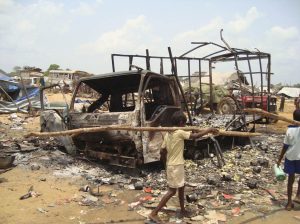Israeli human rights lawyer Eitay Mack wrote in a recent article in Al Jazeera that Israeli weapons, including surveillance unmanned aerial vehicles (UAVs) and other military equipment, were likely used by the Sri Lankan Army in atrocities against civilians during the decades-long war against the Liberation Tigers of Tamil Eelam (LTTE). The Sri Lankan government, he writes, also purchased combat aircraft and battleships from Israel that were used in the commission of war crimes.
Calling for criminal investigations into the involvement of Israeli companies, officials, and individuals in the war crimes committed during the Sri Lankan civil war, Mack has accused the United Nations and Western countries of failing to hold accountable those responsible for the horrific atrocities committed against Tamil civilians.
Western governments and human rights organizations often criticize China and Pakistan for providing weapons and financial aid that helped the Sri Lankan government defeat the LTTE, a group that was labeled terrorist by several countries including India and the U.S., and which many experts described as unbeatable. However, little attention has been paid to the role the Israelis played in the Sri Lankan civil war.
Israel and Sri Lanka formally established diplomatic relations in 1956 but Sri Lanka broke off ties several times due to lobbying from the Arab world. However, when the Tamil insurgency gathered momentum in the 1980s, cooperation between the Sri Lankan and Israeli governments grew. While military cooperation goes back several decades, it was during the presidency of the right-wing J. R. Jayawardene that Sri Lanka first established links with Israeli intelligence in the early 1980s, Uditha Devapriya, an International Relations scholar and chief analyst at Factum, a Colombo-based think tank, told The Diplomat.
Apparently, Sri Lanka had sought security help from the U.S., Britain and West Germany to improve the “intelligence system and [for] training troops in counterinsurgency.” Their refusal forced Colombo to turn to Israel.
In August 1984, the New York Times reported that Israeli intelligence agents were training their Sri Lankan counterparts. Sri Lanka’s National Security Affairs Minister Lalith Athulathmudali told the Times that “the training programs were aimed at overhauling the organization of intelligence gathering, building an effective information-gathering network and training a paramilitary unit to combat the Tamil insurgents.” Since Sri Lanka had broken diplomatic ties with Israel in 1970, the Jayawardene government had allowed Israel “to maintain a special interests section under the protection of the United States Embassy” from June 1, 1984.
According to Israeli analyst Shlomi Yass, the Sri Lankan Army purchased “advanced night vision and communications technology, artillery coordination systems, and Gabriel sea-to-sea missiles. In addition, it acquired drones and ground stations, flak jackets, ammunition, thousands of Uzi submachine guns and Galil assault weapons, mortars, and 155-mm cannons” from Israel.
However, it was Sri Lanka’s Navy and Air Force that benefitted greatly from Israeli weapons. As early as the 1950s, Sri Lanka bought Miznak and Mivtach naval vessels from Israel. During the war against the LTTE, the Sri Lankan Navy acquired Sa’ar 6-class corvette, Shaldag, Dvora, and Super Dvora vessels from Israel, and these played a decisive role in battles against the Sea Tigers, the LTTE’s naval wing.
As for the Sri Lankan Air Force, it purchased seven Kfir jets in 1995 and eight more in 2000. Aviation Week stated that one of the Kfir squadrons logged more than 2,800 operational flight hours and released over 3,500 tons of bombs.
According to Yass, Israel froze defense exports to Sri Lanka in the mid-2000s, prior to the last phase of the war against the LTTE, because it feared that Iran, which was close to the Mahinda Rajapaksa government, would get its hands on Israeli technology.
The civil war in Sri Lanka came to an end in May 2009. Since then, the Sri Lankan government has been under immense pressure from the Western powers to bring to justice those involved in alleged war crimes during the final stages of the war.
Human rights organizations continue to exert pressure on Western governments to impose sanctions against Sri Lankan military and political leaders involved in the war. While the ire of these organizations is often directed at China and Pakistan for providing military and financial aid which ensured Sri Lanka achieve its war objectives, the international community has been silent on Israel’s role.

































